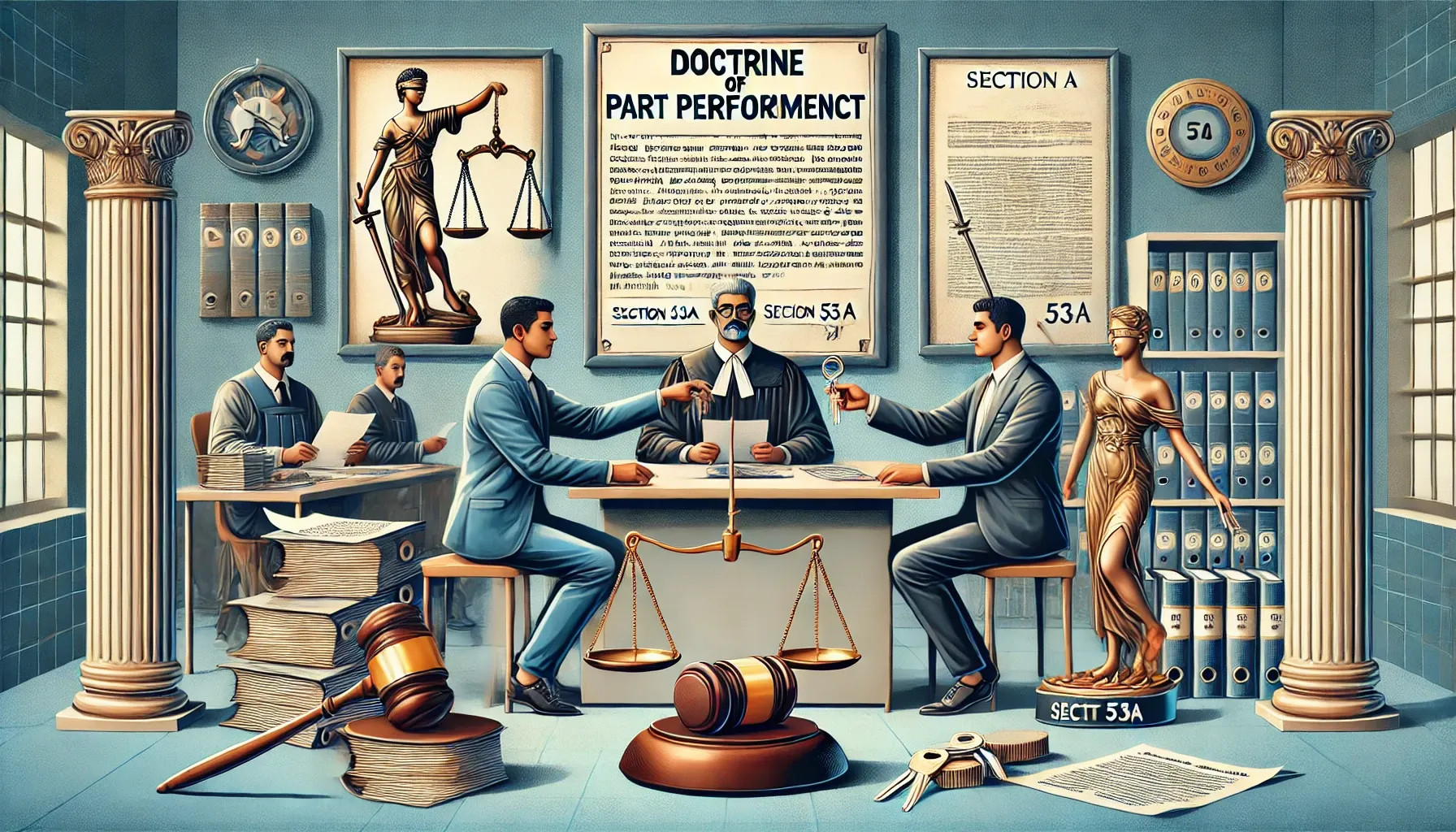
lex-o-pedia
What is John Doe Orders?
John Doe orders address challenges posed by anonymity in legal disputes, particularly in intellectual property rights. Originating in English law, these orders empower courts globally to act against unidentified defendants, balancing rights with enforcement.

lex-o-pedia
What is John Doe Orders?
John Doe orders address challenges posed by anonymity in legal disputes, particularly in intellectual property rights. Originating in English law, these orders empower courts globally to act against unidentified defendants, balancing rights with enforcement.

lex-o-pedia
What are the Commencement, Settlement Agreement, and Termination Procedures of Conciliation Proceedings?
Conciliation is a voluntary dispute resolution process where a neutral conciliator helps parties reach a mutual agreement. It begins with a written invitation, progresses through the appointment of conciliators, and concludes with a legally binding settlement agreement.

lex-o-pedia
What is the Place and Language of Arbitration?
The place and language of arbitration are crucial in shaping procedural fairness, efficiency, and enforceability. Governed by Sections 20 and 22 of the Arbitration and Conciliation Act, 1996, they ensure party autonomy while allowing tribunals discretion when necessary.

lex-o-pedia
What role does Natural Justice play in Arbitration Proceedings?
Natural justice plays a vital role in arbitration proceedings by ensuring fairness, impartiality, and transparency, upholding the right to a fair hearing, and preventing bias. Adherence to these principles strengthens the legitimacy and efficacy of arbitration.

lex-o-pedia
What is the significance of the 'Right to Communication to the Public' and 'Reproduction Right' in the digital age?
The digital age redefines communication and reproduction rights, offering creators global reach while posing copyright challenges. Balancing innovation with intellectual property protection ensures fair use, ethical content sharing, and a thriving creative economy.

lex-o-pedia
What is the significance of differentiating between Capital and Revenue Receipts in Taxation?
Differentiating capital and revenue receipts is vital in taxation to determine tax liability. While revenue receipts from regular operations are taxable, capital receipts, often from non-recurring sources like asset sales or loans, are generally exempt unless specified.

lex-o-pedia
What is the procedure for the appointment of an Arbitral Tribunal?
The appointment of an arbitrator under Section 11 of the Arbitration and Conciliation Act, 1996 ensures impartiality in arbitration when parties cannot agree on a selection. The Chief Justice plays a pivotal role in ensuring timely, fair, and unbiased tribunal formation.

lex-o-pedia
What are the Rights of the Broadcasting Organisations under Copyright Law?
Broadcasting organisations in India are protected under the Copyright Act, 1957, with rights like rebroadcasting, communication to the public, fixation, distribution, and moral rights. These ensure broadcasters control their content, prevent misuse, and monetize effectively.

lex-o-pedia
What is the concept of Income Taxable under the Income Tax Act, 1961?
The Income Tax Act, 1961, taxes income under five heads: salary, house property, business/profession, capital gains, and other sources. Income includes monetary and non-monetary forms, with provisions for deductions, exemptions, and adjustments to compute taxable income.

lex-o-pedia
What makes an Invention Patentable under Indian Law?
A patent grants inventors exclusive rights, fostering innovation by protecting new ideas. Under India's Patents Act, 1970, patentability hinges on novelty, inventive step, and industrial applicability, ensuring only deserving inventions achieve legal protection.

lex-o-pedia
संपत्ति हस्तांतरण अधिनियम, 1882 के अंतर्गत पट्टे से संबंधित क्या प्रावधान हैं? (What are the provisions related to a lease under the Transfer of Property Act, 1882?)
पट्टा संपत्ति हस्तांतरण अधिनियम, 1882 की धारा 105-117 के अंतर्गत परिभाषित है। यह भूमि या संपत्ति के उपयोग का अधिकार एक निश्चित अवधि और प्रतिफल के अधीन देता है। इसमें पक्षकार, अवधि, विषय वस्तु, और अधिकारों व दायित्वों का निर्धारण किया गया है।

lex-o-pedia
What is the Jurisdiction of the Arbitral Tribunal?
The jurisdiction of an arbitral tribunal is rooted in the arbitration agreement, scope of disputes, and legal framework. Governed by principles like competence-competence, tribunals can decide their jurisdiction, issue interim measures, and ensure effective arbitration.

lex-o-pedia
अचल संपत्ति का बंधक क्या है? (What is the Mortgage of Immovable Property?)
बंधक एक कानूनी व्यवस्था है, जिसमें उधारकर्ता अपनी स्थावर संपत्ति को ऋण के बदले सुरक्षा के रूप में देता है। संपत्ति हस्तांतरण अधिनियम, 1882 के तहत बंधक के विभिन्न प्रकार और अधिकार निर्धारित हैं, जैसे सादा बंधक, सशर्त विक्रय, और मोचन अधिकार।

lex-o-pedia
Do Computer-Generated works qualify for Copyright Protection?
Copyright law protects original works, including computer software, under India's Copyright Act of 1957. While AI-generated works raise questions about authorship, the Act doesn’t explicitly address them. As AI advances, copyright law may need reform to accommodate these changes.

lex-o-pedia
संपत्ति हस्तांतरण अधिनियम के तहत अजन्मे व्यक्ति के लाभ के लिए हस्तांतरण कैसे किया जाता है?
संपत्ति हस्तांतरण अधिनियम, 1882 की धारा 13 के तहत अजन्मे व्यक्ति के लाभ के लिए संपत्ति का हस्तांतरण किया जा सकता है। इसमें पहले एक जीवित व्यक्ति के पक्ष में जीवनहित का सृजन और अजन्मे व्यक्ति को संपत्ति में पूर्ण हित का प्रावधान होता है।

lex-o-pedia
Why are certain Inventions not granted Patent in India?
The Indian Patent Act, 1970, under Sections 3 and 4, excludes certain inventions from patentability to protect public interest, ethics, and natural principles. Non-patentable categories include frivolous inventions, natural discoveries, and methods against public order.

lex-o-pedia
What is Judicial Notice under the Bharatiya Sakshaya Adhiniyam, 2023?
Judicial notice under the Bharatiya Sakshaya Adhiniyam, 2023, enables courts to recognize facts universally accepted or easily verifiable without formal proof, such as laws, treaties, or public holidays. This promotes efficiency while ensuring fairness in legal proceedings.

lex-o-pedia
What is the Doctrine of “Work for Hire” under Copyright Law?
The "Work for Hire" doctrine assigns copyright ownership to employers or commissioning parties for works created under employment or specific contracts. It ensures clarity in ownership, balancing creators' rights with employers' or clients' interests, unless agreed otherwise.

lex-o-pedia
What is the role of a Conciliator?
A conciliator, as a neutral third party, facilitates dispute resolution through open dialogue, identifying key issues, and proposing solutions. Their role includes fostering communication, maintaining impartiality, ensuring confidentiality, and guiding parties to a voluntary settlement.

lex-o-pedia
What is the concept of Goods and Services Tax (GST)?
The Goods and Services Tax (GST) is a unified, destination-based tax on goods and services in India, replacing multiple indirect taxes. It ensures seamless tax credit, eliminates cascading effects, and is structured under CGST, SGST, and IGST for efficiency.

lex-o-pedia
What is the process of Admission under the Bharatiya Sakshya Adhiniyam, 2023?
The Bharatiya Sakshya Adhiniyam, 2023, governs admissions under Sections 15-21, defining them as oral, written, or electronic statements relevant to legal disputes. It balances evidentiary value with fairness, addressing admissibility, relevance, and confidentiality.

lex-o-pedia
What is Compulsory Licensing under Copyright Law?
Compulsory licensing under copyright law allows the use of copyrighted works without the owner’s consent when access is restricted. It ensures public access to creative works while compensating creators, balancing copyright protection and societal needs.

lex-o-pedia
Is expert testimony an important aspect of the Indian legal system, and how are Sections 39 and 40 of the Bharatiya Sakshya Adhiniyam, 2023 relevant to it?
Expert testimony is vital in complex cases requiring specialized knowledge. Sections 39 and 40 of the Bharatiya Sakshya Adhiniyam, 2023, govern the admissibility and scope of expert opinions, ensuring their relevance and reliability in legal decisions.

lex-o-pedia
क्या संपत्ति हस्तांतरण अधिनियम के अंतर्गत भागिक पालन का सिद्धांत (Doctrine of Part Performance) लागू होता है?
भागिक पालन का सिद्धांत भारतीय संपत्ति अधिनियम, 1882 के तहत कार्य करता है। यह सिद्धांत तब लागू होता है जब कोई व्यक्ति संपत्ति के स्थानांतरण के लिए कार्य करता है, भले ही अनुबंध लिखित न हो, और उसे न्यायालय में मान्यता मिल सकती है।

lex-o-pedia
What constitutes Copyright in Musical Works?
Copyright in musical works safeguards the rights of creators, including composers and lyricists, by providing exclusive control over their compositions. It fosters innovation, ensures financial rewards through royalties, and balances the interests of original and remix creators.

